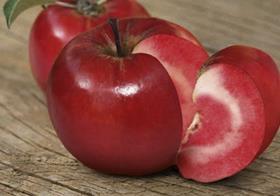
Newspapers in the UK have this morning heralded the launch of 'the world's first red-fleshed apple', following the launch of two new varieties registered under the Redlove trademark.
According to the reports, UK-based seed and sapling company Suttons has secured the exclusive rights to sell young saplings which will bear the two varieties, Redlove Era and Redlove Sirena, and has already received 1,500 orders for the trees from amateur horticulturalists.
Era and Sirena are apparently being planted in orchards across Europe, with supermarkets expected to start selling the apples around five years from now.
However, no precise details have yet been provided as to when exactly the fruit will go on sale.
Tom Sharples, spokesman for Suttons, told the Daily Mail: 'This is the very first red-fleshed, fine-tasting apple in the world. It has a delicious sweet and tangy taste with a hint of berries to it if eaten raw and is also ideal for cooking.'
He added: 'This has been a natural breeding process and no genetic modification techniques have been used. The trees were grown in tunnels rather than outdoors so that there would be no random pollination from bees.'
Era and Sirena are the fruits of a 20-year research programme overseen by Markus Kobelt, who operates the Lubera nursery in Buchs, Switzerland.
To produce the Redlove varieties, Mr Kobelt cross-pollinated different apple cultivars of apple including Royal Gala and Braeburn with another specimen that has pink flesh but no taste.
Era can be harvested from September and stored up until Christmas, while Sirena is harvested from August and stored until October.
Really a first?
Whether or not Redlove is in fact the world's first red-fleshed apple remains open to debate, however.
In March 2006, New Zealand-based research institute Plant & Food Research (then known as HortResearch) debuted a red-fleshed apple in partnership with its global topfruit marketing partner Prevar.
Then last August, news emerged of the first trial plantings of red-fleshed apple called Weirouge in the Val Venosta area of Italy's South Tyrol region.
Producer Karl Luggin said he planned to harvest the variety from 3,500 new trees last September and told reporters that Weirouge could end up being released on the general market by as early as 2013.
A few weeks later, Chinese group Goldland Fruit Group exhibited its own red-fleshed apple at the annual Asia Fruit Logistica trade fair in Hong Kong.
Bred by Dutch company Next Fruit Generation, the variety is now being planted and marketed in China under licence by Goldland.
'We're starting to propagate this variety in our nursery in Hebei Province and we expect to develop commercial production in the next few years,' explained Goldland chairman Leo Chiu.
Dr Richard Espley, a molecular biologist at Plant & Food Research, has been closely involved in the group's research into red-fleshed apples.
'Red apples, with red flesh as well as red skin, occur naturally in the apple origin regions of Central Asia,' he told a recent industry meeting in Auckland. 'However, these apples are normally quite bitter tasting so need to be crossed with flavoursome white fleshed apples to produce a commercially-viable, red-fleshed eating cultivar.'
He added: 'Being able to screen for the red-flesh gene in seedlings will allow breeders to isolate and focus on new varieties of apple with red flesh characteristics at an early stage, speeding up the breeding process.'



